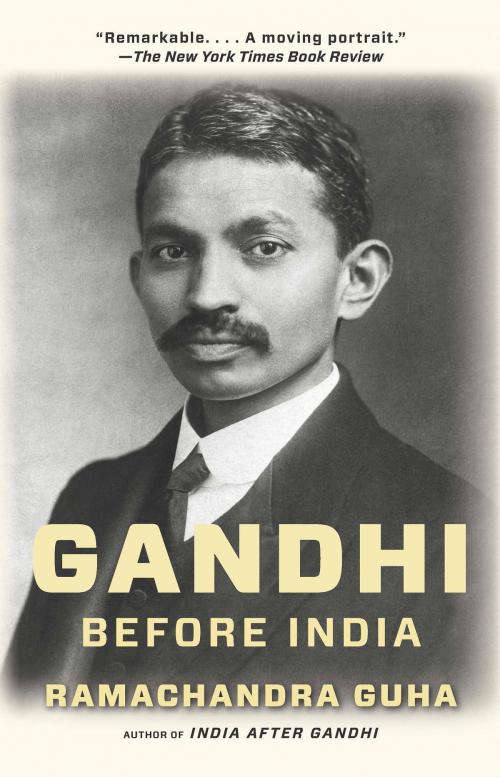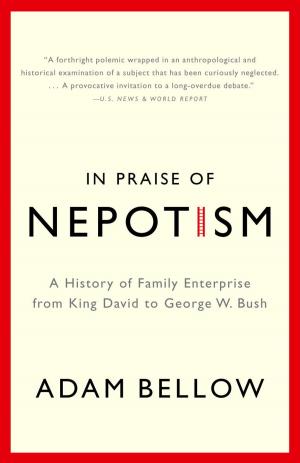| Author: | Ramachandra Guha | ISBN: | 9780385532303 |
| Publisher: | Knopf Doubleday Publishing Group | Publication: | April 15, 2014 |
| Imprint: | Vintage | Language: | English |
| Author: | Ramachandra Guha |
| ISBN: | 9780385532303 |
| Publisher: | Knopf Doubleday Publishing Group |
| Publication: | April 15, 2014 |
| Imprint: | Vintage |
| Language: | English |
Here is the first volume of a magisterial biography of Mohandas Gandhi that gives us the most illuminating portrait we have had of the life, the work and the historical context of one of the most abidingly influential—and controversial—men in modern history.
Ramachandra Guha—hailed by Time as “Indian democracy’s preeminent chronicler”—takes us from Gandhi’s birth in 1869 through his upbringing in Gujarat, his two years as a student in London and his two decades as a lawyer and community organizer in South Africa. Guha has uncovered myriad previously untapped documents, including private papers of Gandhi’s contemporaries and co-workers; contemporary newspapers and court documents; the writings of Gandhi’s children; and secret files kept by British Empire functionaries. Using this wealth of material in an exuberant, brilliantly nuanced and detailed narrative, Guha describes the social, political and personal worlds inside of which Gandhi began the journey that would earn him the honorific Mahatma: “Great Soul.” And, more clearly than ever before, he elucidates how Gandhi’s work in South Africa—far from being a mere prelude to his accomplishments in India—was profoundly influential in his evolution as a family man, political thinker, social reformer and, ultimately, beloved leader.
In 1893, when Gandhi set sail for South Africa, he was a twenty-three-year-old lawyer who had failed to establish himself in India. In this remarkable biography, the author makes clear the fundamental ways in which Gandhi’s ideas were shaped before his return to India in 1915. It was during his years in England and South Africa, Guha shows us, that Gandhi came to understand the nature of imperialism and racism; and in South Africa that he forged the philosophy and techniques that would undermine and eventually overthrow the British Raj.
Gandhi Before India gives us equally vivid portraits of the man and the world he lived in: a world of sharp contrasts among the coastal culture of his birthplace, High Victorian London, and colonial South Africa. It explores in abundant detail Gandhi’s experiments with dissident cults such as the Tolstoyans; his friendships with radical Jews, heterodox Christians and devout Muslims; his enmities and rivalries; and his often overlooked failures as a husband and father. It tells the dramatic, profoundly moving story of how Gandhi inspired the devotion of thousands of followers in South Africa as he mobilized a cross-class and inter-religious coalition, pledged to non-violence in their battle against a brutally racist regime.
Researched with unequaled depth and breadth, and written with extraordinary grace and clarity, Gandhi Before India is, on every level, fully commensurate with its subject. It will radically alter our understanding and appreciation of twentieth-century India’s greatest man.
Here is the first volume of a magisterial biography of Mohandas Gandhi that gives us the most illuminating portrait we have had of the life, the work and the historical context of one of the most abidingly influential—and controversial—men in modern history.
Ramachandra Guha—hailed by Time as “Indian democracy’s preeminent chronicler”—takes us from Gandhi’s birth in 1869 through his upbringing in Gujarat, his two years as a student in London and his two decades as a lawyer and community organizer in South Africa. Guha has uncovered myriad previously untapped documents, including private papers of Gandhi’s contemporaries and co-workers; contemporary newspapers and court documents; the writings of Gandhi’s children; and secret files kept by British Empire functionaries. Using this wealth of material in an exuberant, brilliantly nuanced and detailed narrative, Guha describes the social, political and personal worlds inside of which Gandhi began the journey that would earn him the honorific Mahatma: “Great Soul.” And, more clearly than ever before, he elucidates how Gandhi’s work in South Africa—far from being a mere prelude to his accomplishments in India—was profoundly influential in his evolution as a family man, political thinker, social reformer and, ultimately, beloved leader.
In 1893, when Gandhi set sail for South Africa, he was a twenty-three-year-old lawyer who had failed to establish himself in India. In this remarkable biography, the author makes clear the fundamental ways in which Gandhi’s ideas were shaped before his return to India in 1915. It was during his years in England and South Africa, Guha shows us, that Gandhi came to understand the nature of imperialism and racism; and in South Africa that he forged the philosophy and techniques that would undermine and eventually overthrow the British Raj.
Gandhi Before India gives us equally vivid portraits of the man and the world he lived in: a world of sharp contrasts among the coastal culture of his birthplace, High Victorian London, and colonial South Africa. It explores in abundant detail Gandhi’s experiments with dissident cults such as the Tolstoyans; his friendships with radical Jews, heterodox Christians and devout Muslims; his enmities and rivalries; and his often overlooked failures as a husband and father. It tells the dramatic, profoundly moving story of how Gandhi inspired the devotion of thousands of followers in South Africa as he mobilized a cross-class and inter-religious coalition, pledged to non-violence in their battle against a brutally racist regime.
Researched with unequaled depth and breadth, and written with extraordinary grace and clarity, Gandhi Before India is, on every level, fully commensurate with its subject. It will radically alter our understanding and appreciation of twentieth-century India’s greatest man.















